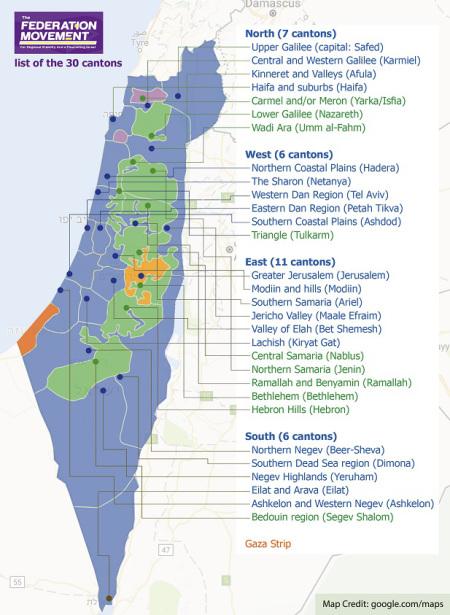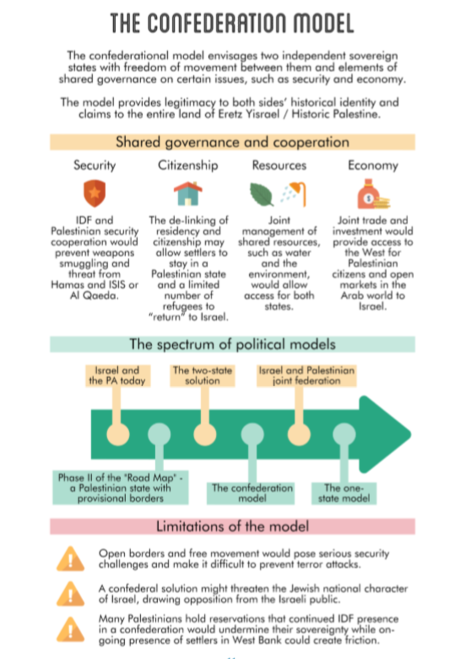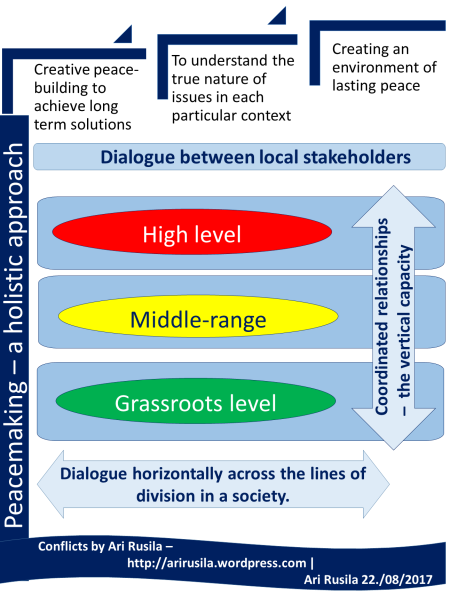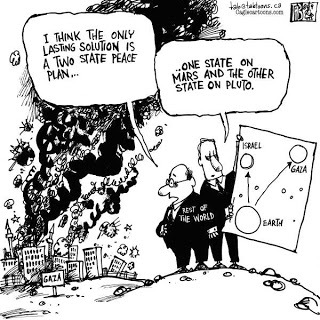 Throughout two decades of the Israeli-Palestinian “peace process,” direct negotiation with aim of ‘Two-State’ solution has been perceived as the only paradigm of international community and it has been the main option for Israeli and Palestinian authorities. The outcome has been a serial of repeated failures reaching peace agreements and implementing e.g. Oslo accords, combined with varying levels of violent confrontations. There is deepening lack of trust between Israelis and Palestinians and more blaming the other party for failure to progress, and destroying the belief that an agreement is possible in the foreseeable future. The bottom line: Two-State solution and the roadmap towards it seems to be the dead end at least in the short term and sure with its outdated version.
Throughout two decades of the Israeli-Palestinian “peace process,” direct negotiation with aim of ‘Two-State’ solution has been perceived as the only paradigm of international community and it has been the main option for Israeli and Palestinian authorities. The outcome has been a serial of repeated failures reaching peace agreements and implementing e.g. Oslo accords, combined with varying levels of violent confrontations. There is deepening lack of trust between Israelis and Palestinians and more blaming the other party for failure to progress, and destroying the belief that an agreement is possible in the foreseeable future. The bottom line: Two-State solution and the roadmap towards it seems to be the dead end at least in the short term and sure with its outdated version.
As possible solutions for Israeli-Palestinian conflict there has been besides 2-State solution also bi-national ‘One-State’ solution, partial solutions like Sinai and Jordan Options and different variations of ‘Three States’ solutions. One of course easy ‘solution’ is zero-option – ‘frozen conflict’ or ‘status quo’ scenario which can be implemented also through pseudo-talks. Today also unilateral actions – instead vain negotiations – can pave way towards some solutions.
 Recently a new approach to the Jewish-Arab/Palestinian conflict was proposed by sc Federation Movement. Its Federation Plan or Federation Program presents a new approach to the Jewish-Arab/Palestinian conflict. The plan calls for a transformation of Israel’s system of governance into a federal government, such as is found in the USA, Canada, Switzerland and 25 others countries. This will be a progressive regional system whereby the State of Israel is divided into cantons (empowered provinces), which enjoy a great degree of independence in managing their affairs.
Recently a new approach to the Jewish-Arab/Palestinian conflict was proposed by sc Federation Movement. Its Federation Plan or Federation Program presents a new approach to the Jewish-Arab/Palestinian conflict. The plan calls for a transformation of Israel’s system of governance into a federal government, such as is found in the USA, Canada, Switzerland and 25 others countries. This will be a progressive regional system whereby the State of Israel is divided into cantons (empowered provinces), which enjoy a great degree of independence in managing their affairs.
The Federation Program
According their webpage The Federation Movement is a public ideological movement which advocates a new political approach in order to achieve regional stability and prosperity. The key points of The Federation Program/Plan are following:
-
Application of Israeli law to Judea, Samaria and the Jordan Valley (the West Bank)
-
Obtaining broad international consensus to leave settlements in place
-
Granting of Israeli citizenship and rights to Palestinian residents of the West Bank who are interested
-
Formulation of one single common constitution, accepted by the majority of Israelis as well as the Arabs of the West Bank
-
Formulation of a common vision for the federal state
-
Establishment of a federal government, and the division of the country into 30 cantons, 20 of which will have a Jewish majority and ten will have Arab majorities (one of which will have a Druze majority).
-
Establishment of an additional house of representatives in the Knesset: the Council of Cantons.
-
Foster reciprocal and collaborative relations between Jewish cantons and Arab and Palestinian cantons.
-
Economic and social reconstruction of refugee camps in the West Bank and Jerusalem and Bedouin settlements in the Negev
-
Obtain international recognition and support for the application of Israeli law in the West Bank, the granting of citizenship to West Bank Palestinians, and Israel’s transformation into a federal state
-
Promotion of joint economic developments with neighboring countries, primarily Jordan and Egypt
-
Maintaining the Gaza Strip as a separate entity.
-
The Jewish population will maintain its unique relationship with the Jewish diaspora, while the Arab population will develop similar reciprocal relations with the Arab and Muslim worlds. The Druze will enhance their special relationship with the Druze population in Syria and Lebanon.

Overview
The Federation Movement believes that the enactment of Israeli law in Judea and Samaria and the bestowing of citizenship rights to their residents is the only realistic solution to the Arab-Israeli conflict that does not entail displacing hundreds of thousands of people from their homes. It believes that a federal government between the Mediterranean and the Jordan will provide all residents with security, peace, and economic and social prosperity.
The plan calls for a transformation of Israel’s system of governance into a federal government. The implementation of the federation plan entails formalizing the status quo. The State of Israel, together with the West Bank, but excluding Gaza, are already in practice one federal bi-national state: The IDF and other Israeli security forces control the West Bank; The Israeli Shekel is the coin used in the Palestinian Authority; 85% of the West Bank’s agricultural and industrial products is sold in Israel; 300 thousand out of 800 thousand Palestinians who work are employed in Israel and in Jewish settlements; approximately half of the Palestinian Authority’s budget is funded by taxes levied on Palestinian workers in Israel; about 300 thousand Palestinians in East Jerusalem hold Israeli residency cards, which allow them to work and move through all of Israel freely; more than 400 thousand Israeli Jews live in approximately 160 settlements throughout the West Bank.
Each canton – empowered province/autonomous district – will have its own government and representative council, which will legislate local law and administer education, local government, policing, planning and housing, and the like. The federal government will oversee matters of security, foreign relations and macro-economics. The Knesset will be expanded to include, in addition to the legislative assembly of today, an assembly of representatives from the cantons. The cantons’ high level of administrative autonomy will enable each canton to manage life in accordance with that canton’s population profile, the only limitation being the constitutional obligation to maintain the civil rights of all the citizens of the federation.
According an interview in Fathom The Federation Movement claims that the Israeli political system remains for all intents and purposes neutralised when it comes to a political resolution of the conflict: neither the Right which mostly objects to the two-state solution, nor the Left which will probably be too weak to implement the required withdrawal of about 30,000 households from the West Bank should it regain power in the near future, will likely be willing or able to garner the required majority in the Knesset or whip up the necessary public support to carry out such a major national undertaking and the traumatic measures it entails.
Another option raised in Israel, a unilateral withdrawal, is politically just as unlikely to materialise as is a negotiated two-state solution. After the 2005 Gaza withdrawal precedent, where Hamas took over the Gaza Strip, it is highly improbable that Israel will give up territory or remove settlers and settlements without getting anything tangible in return from the Palestinians, even if strategic thinking and common sense would call for such a move to keep the two-state solution alive.
So – according Fathom – The Federation Movement believes that their approach does have advantages, especially when looking at the alternatives, a continuation of the status-quo or an apartheid state. The biggest advantage is that political implementation appears easier since there is no need for a formal agreement, there is no need for a large scale withdrawal of Jewish settlements and the economic well-being of the whole area will improve substantially after a period of adaptation.
The context
There is a strong believe that regional cooperation based on the Riyadh declaration will soon led to Israeli-Palestinian negotiations. The American – President Trump’s – plan will most probably, or according most optimistic view, be made public even before X-mass 2017, and it will be of a regional nature. It will emphasize regional cooperation against radical Islamists and Iranian ambitions. The United States will lead cooperative measures and consultations with Egypt, Saudi Arabia, Jordan, the Palestinian Authority and Israel. Israeli-Palestinian peace negotiations should take place within this context to bring about regional peace. This is an ambitious plan, yet according to the American diplomat, a feasible one; it does not impose or rule out a two-state solution.
There is speculations that the American plan includes a Palestinian state with limited sovereignty, providing that all of the West Bank remains under Israel’s security control. The US administration will put forth plans aimed at solving the outstanding issue of the Palestinian refugees by settling them in the countries they reside in. A major emphasis will be placed on economic investments for the Palestinians, as well as regional cooperation, anti-terror measures and normalization of relations between the Arab states and Israel, on the basis of the 2002 Saudi peace initiative.
My view
At first place the federation idea sounds interesting as it seems to solve a basic dilemma in Israeli-Palestinian conflict: how Israel same time can survive as a Jewish state, have real democracy and keep – more or less – post-1967 boundaries especially in West Bank. In my opinion democratic One-state, Israel-Palestine federation or confederation based on cantons might work in theory but not in practice at least for decades.
My argument is that even since early times of British Mandate first the Pan-Islamic and then pan-Arab rhetoric expressed fundamental ethnic and religious objections to Jews and for the establishment of a Jewish national home in Palestine. The history of repeated aggressions by neighbours have also created deep distrust among Jews about Palestinians. This kind of ecosystem and peoples’ minds are challenging to transform peaceful coexistence with eternal enemy; it might take decades and generations to change fundamental ethic values. Repetitive variations of influence, education, indoctrination, culture and internationalization have grafted wide ecosystem of Palestinian nationalism – new post-1967 Palestinian national identity; which in turn appeals to latent anti-Semitism.
BICOM research team published on 31st March 2017 a policy paper proposing a new “hybrid” approach to Israeli-Palestinian peace-making. The dialogue analysed and critiqued four models for Israeli-Palestinian peacemaking: Bilateral negotiations focused on agreed parameters; a regional framework; constructive unilateralism; and Israeli-Palestinian confederation.
A consequent absence of a peace process might create the conditions for the emergence of a new paradigm to replace the defunct “two-state solution.” This new paradigm I call as [revised] “hybrid” approach to Israeli-Palestinian peace-making. (More in Israeli-Palestinian Conflict: A Revised Hybrid Model as Solution )

The difference between Herzl’s generation and post-1948 generations was a first-hand understanding of what the absence of a Jewish state means for Jewish survival. The state represents the difference between autonomy and servility, indeed between life and death. In my opinion Israel-Palestine confederation model would be too close one-state solution which would destroy Israel as “Jewish” state. Instead of this model I see Palestine-Jordan confederation much more better alternative.
I agree with Blue White Future co-chairmen Gilead Sher and Orni Petruschka who argue that the two-state solution is in political trouble but it is still achievable and imperative to the respective parties. However a different paradigm is needed, one that is not based solely on bilateral negotiations towards a fully-fledged Permanent Status peace agreement and thus does not require mutual trust as a necessary condition for progress.
According Sher and Petruschka a more realistic target – than a comprehensive agreement – is a ‘divorce’ two-state agreement between the parties, focused on phased separation between the sides and an absence of violence.
Instead of moving towards an agreement to two states, we need to define our goal as moving towards a reality of two states, and to advance gradually towards that goal. This approach consists of constructive steps that each side can take, independently of the other, in order to advance a situation – both on the ground and in the political realm – which is closer to two states.
My conclusion is that now is the right moment to explore the regional alternative based on maybe soon coming American plan. From my point of view “regional peace process” can be implemented by Egypt, Jordan and Israel and instead of Arab Peace Initiative be based on Sinai and Jordan options. If there is no progress during coming months then the best way forwards from my perspective is Israeli unilateral actions hopefully based on “Constructive Unilateralism” approach.
In long term and in ideal world also with Israeli-Palestinian conflict – a deeper holistic approach is needed to make more sustainable solutions.

Sources:
The Federation Movement and Fathom
Related background papers:
Fathom has published an eBook – Two States for Two Peoples – a collection of essays and interviews drawn from the pages of Fathom focused on the two-state solution and how to reinvigorate it. To download the eBook, click here.
The new “hybrid” approach to Israeli-Palestinian peace-making by BICOM
BESA Center Perspectives Paper No. 425, March 15, 2017: Becoming Part of Jordan and Egypt: A Palestinian Economic Imperative By Prof. Hillel Frisch; View PDF
Related articles:
Peacemaking – a Holistic Approach
Israeli-Palestinian Conflict: A Revised Hybrid Model as Solution
Palestinians Put Jordanian Option on the Table
Israel-Palestine Conflict: Regional Approach
Israel’s 5 Strategy Options Regarding West Bank After Abbas
Trump Presidency Brings Realpolitik Back To Mid-East
Constructive Unilateralism (II) as Solution to Israeli-Palestinian Conflict
Herzog’s Plan: Security Barrier Around the Major Settlement Blocs of West Bank
Analysis: Resolving The Israeli-Palestinian Conflict


